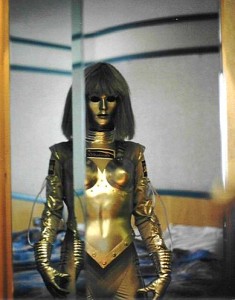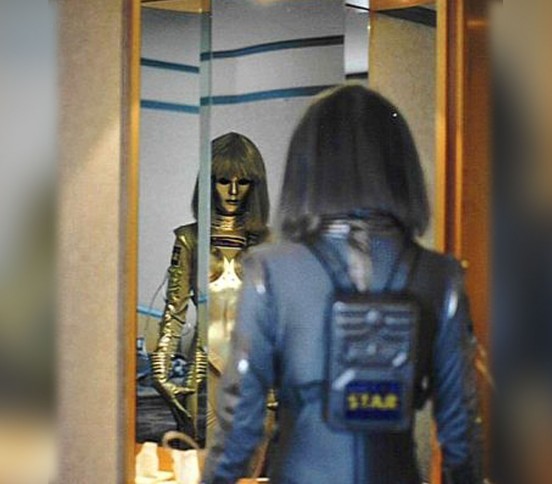Recently the local radio service in Slough, Maidenhead & Windsor ‘Time 106.6’ was closed by the current owners. Previously this station was known as ‘Star FM’ and when first opened in the mid 1990’s was one of the first UK stations to adopt computer playout technology.
This was futuristic stuff back in 1995, while the rest of us were using carts, splicing quarter inch tape and ruining our wristwatches in the bulk eraser. At Star FM, PD Paul Owens was proudly declaring that
We have now have decided that it is far better overnight to have what we call an “A Team Android” rather than a “B Team Disc Jockey.”
 In fact that automated overnight sequence with pre-recorded voice tracks became a feature in it’s own right. Rather than hide the fact that it was an “out of town” jock from another group station, the computer became the star with the world’s first “Android radio presenter” – Twinkle. One wonders what the morning show host made of it all when one of the promotions team dressed as a robot “up staged” them at station events.
In fact that automated overnight sequence with pre-recorded voice tracks became a feature in it’s own right. Rather than hide the fact that it was an “out of town” jock from another group station, the computer became the star with the world’s first “Android radio presenter” – Twinkle. One wonders what the morning show host made of it all when one of the promotions team dressed as a robot “up staged” them at station events.
Here dubbed from my cassette tape archives is a piece from an edition of BBC Radio Four’s Mediumwave, from 30th July 1995.
The special “radio” edition of the programme is hosted by “Capital Radio’s” Richard Park and included this report from Steven Barnett, lecturer in communications, University of Westminster on how “automation was very much the name of the game” at Star FM.
Paul Owens, Programme Controller of Star FM commented in this piece:
If I drive to one of my radio stations…I can not tell whether the radio station is actually live at that moment, or whether the presenter has chosen to do what we call “time shift”. If your creative idea is right there why not be able to press a button to open your microphone and let your creative juices flow THEN?
When questioned if such time shifting, or voice tracking as we’d all come to know it, would loose the spark of liveness, Owens made a credible rebuttal:
If I am reading a piece of community information and I stumble three times over the the name of the organisation, what service would I seriously be providing the listener by leaving that in?
The piece goes on to give an example of voice tracking part of his programme because he needs to go off for a lunchtime meeting. It doesn’t take much to deduct this is not a case of ensuring a slick performance, more a case that the lunchtime jock also has other responsibilities at the radio station.
It’s interesting to analyse with the benefit of a couple of decades hindsight of the eventual conglomeration of many “local radio stations” in the UK, his comments on being asked what the USP of a local radio station like Star FM was. I’ll leave it to an exercise for you to come to your own conclusion to the success or otherwise of GWR Group’s strategy given their ultimate end as part of ‘super conglomerate’ Global Radio.
Predominately local news and information, and we’ve got to do this non cynically … there is a commercial imperative. This is not an altruistic response to a perfectly sensible question. It is a hard nosed business decision … I think that there are some excellent groups emerging in this country who really have the interests of radio at heart. Some people criticise the GWR Group for their programming style. Some people claim they are not a local as other radio stations. I think those groups who actually do abandon localness do so at their peril. Short term they may see no loss, they may even see short term gain, but medium and long term they will loose it, because localness for a local radio station is everything.
While you’re pondering that, I’ll sidetrack and wonder if Richard Park would take up a freelance gig as stand-in for Steve Hewlett on The Media Show today?
Photo Credits: “Twinkle Dressing Room” by lemoncat1





Comments by Phil Edmonds
Digital Radio – Clearing the way for radio’s future
Dan, I will be putting up a link for people ...
Adobe Audition 3 (plus CS2) for free – too good to be true?
Some updates: Today, I tried logging into my Adobe account and ...
Bite a discount on your train station coffee
Update April 2012 - you now need to re-register for ...
Attempt to Save WordPress Post bug
Just as an addition to this - it appears that ...